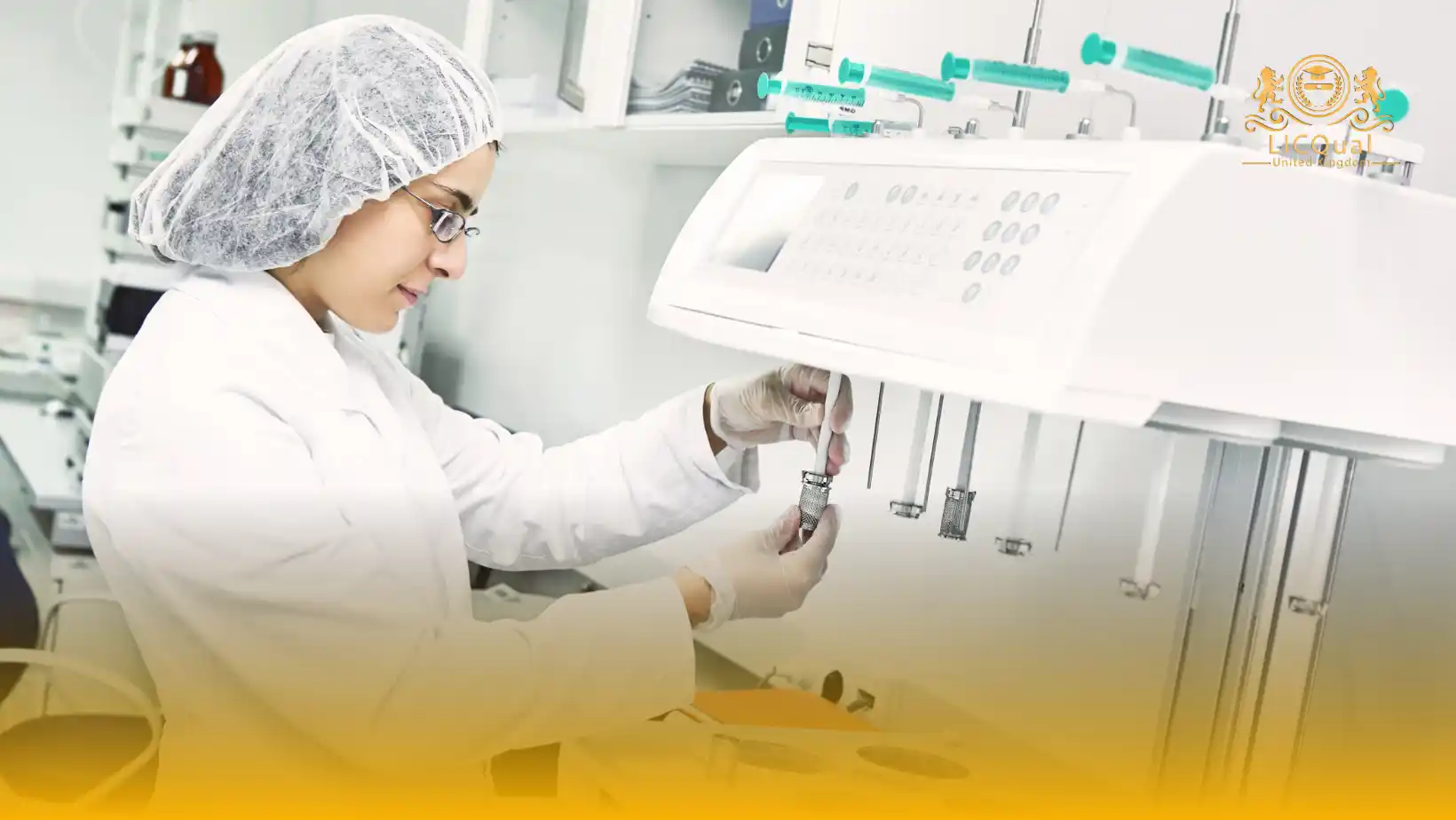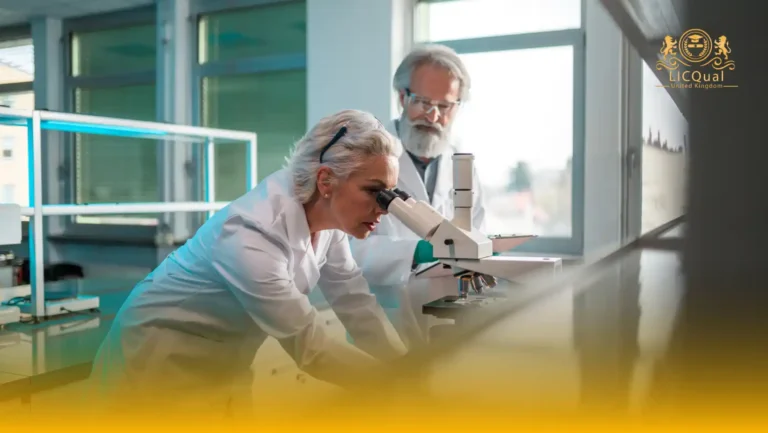The LICQual Level 3 Certificate in Pharmaceutical Biotechnology (Cert Pharmaceutical Biotechnology) is a specialised qualification designed for learners who wish to develop in-depth knowledge and practical skills in the rapidly evolving field of pharmaceutical biotechnology. This course provides a comprehensive understanding of biotechnological principles, drug development processes, and applications in modern pharmaceutical industries, preparing learners to contribute effectively to research, production, and clinical applications.
This qualification is aimed at professionals who wish to enhance their career prospects, expand their scientific expertise, and strengthen their Continuing Professional Development (CPD). Learners will explore key areas such as molecular biology, bioprocessing, recombinant DNA technology, cell culture, and regulatory standards within pharmaceutical biotechnology. By integrating both theoretical knowledge and practical applications, the course equips learners with the essential skills required to meet the challenges of modern biopharmaceutical research and production.
Centres delivering this qualification must ensure that competent and qualified staff, alongside up-to-date learning materials, laboratory facilities, and technological resources, are available to provide a high-quality training experience. Access to scientific literature, practical exercises, and structured guidance ensures learners can achieve their learning objectives effectively and safely.
Completing the LICQual Level 3 Certificate in Pharmaceutical Biotechnology provides learners with a recognised qualification that not only enhances professional competence but also opens pathways for career progression in biopharmaceutical research, drug development, and biotechnology industries. This course is ideal for learners committed to advancing their expertise and making a meaningful impact in pharmaceutical biotechnology.
Course Overview
Qualification Title
LICQual Level 3 Certificate in Pharmaceutical Biotechnology (Cert Pharmaceutical Biotechnology)
Total Units
6
Total Credits
24
GLH
120
Qualification #
LICQ2201145
Qualification Specification
To enroll in the LICQual Level 3 Certificate in Pharmaceutical Biotechnology (Cert Pharmaceutical Biotechnology) , applicants must meet the following criteria:
|
Qualification# |
Unit Title |
Credits |
GLH |
|---|---|---|---|
|
LICQ2201145-1 |
Fundamentals of Pharmaceutical Biotechnology |
4 |
20 |
|
LICQ2201145-2 |
Molecular Biology and Genetic Engineering in Pharmaceuticals |
4 |
20 |
|
LICQ2201145-3 |
Bioprocessing and Production of Biopharmaceuticals |
4 |
20 |
|
LICQ2201145-4 |
Quality Assurance, Regulatory Compliance, and Ethics |
4 |
20 |
|
LICQ2201145-5 |
Clinical Applications and Therapeutic Biotechnology |
4 |
20 |
|
LICQ2201145-6 |
Research Methods and Emerging Trends in Pharmaceutical Biotechnology |
4 |
20 |
By the end of this course, learners will be able to:
Unit 1: Fundamentals of Pharmaceutical Biotechnology
Learners will be able to:
- Understand the basic principles and scope of pharmaceutical biotechnology.
- Describe the role of biotechnology in modern drug development.
- Analyse the differences between traditional pharmaceuticals and biopharmaceutical products.
- Explain key concepts in molecular and cellular biology relevant to pharmaceutical applications.
Unit 2: Molecular Biology and Genetic Engineering in Pharmaceuticals
Learners will be able to:
- Understand molecular biology techniques used in pharmaceutical research.
- Apply principles of genetic engineering for drug development.
- Evaluate the use of recombinant DNA, gene cloning, and protein expression in biotechnology.
- Demonstrate knowledge of safety and ethical considerations in genetic engineering.
Unit 3: Bioprocessing and Production of Biopharmaceuticals
Learners will be able to:
- Understand the core processes involved in biopharmaceutical production, including fermentation and cell culture.
- Apply knowledge of upstream and downstream processing techniques.
- Analyse strategies for optimising yield and product quality.
- Demonstrate awareness of Good Manufacturing Practice (GMP) in biopharmaceutical production.
Unit 4: Quality Assurance, Regulatory Compliance, and Ethics
Learners will be able to:
- Understand regulatory frameworks and guidelines for pharmaceutical biotechnology.
- Apply quality assurance principles to ensure product safety, efficacy, and compliance.
- Evaluate ethical considerations in biopharmaceutical research and development.
- Demonstrate knowledge of documentation, audits, and standard operating procedures.
Unit 5: Clinical Applications and Therapeutic Biotechnology
Learners will be able to:
- Identify therapeutic uses of biopharmaceutical products in healthcare.
- Understand the role of biologics, vaccines, and gene therapies in treatment.
- Analyse benefits, risks, and clinical outcomes of therapeutic biotechnology.
- Apply knowledge to support evidence-based clinical decision-making.
Unit 6: Research Methods and Emerging Trends in Pharmaceutical Biotechnology
Learners will be able to:
- Apply research methodologies relevant to pharmaceutical biotechnology.
- Critically evaluate current scientific literature and emerging technologies.
- Understand the impact of innovation on drug discovery and development.
- Develop skills for independent research and reflective professional practice.
The LICQual Level 3 Certificate in Pharmaceutical Biotechnology (Cert Pharmaceutical Biotechnology) is designed for professionals, graduates, and researchers who want to advance their expertise in biotechnology-driven pharmaceutical sciences. This internationally accredited pharmaceutical biotechnology certification is ideal for those seeking CPD credits, career growth, and recognition in global healthcare and life sciences. Whether you are already working in the pharmaceutical industry or planning to specialize, this program equips you with the skills and qualifications to stand out in biotechnology and drug development.
1. Practicing Pharmacists
- Professionals aiming to expand into biotechnology and pharmaceutical innovation
- Interested in biologics, biosimilars, and advanced therapeutic products
- Seeking accredited pharmaceutical biotechnology certification for career growth
- Looking to earn CPD credits recognized internationally
- Committed to improving patient outcomes through biotechnology-driven medicines
2. Healthcare Professionals in Clinical and Research Settings
- Doctors, nurses, and allied health staff working with biotechnology-based drugs
- Those aiming to strengthen interdisciplinary collaboration in drug development
- Professionals seeking structured training in pharmaceutical biotechnology
- Interested in international healthcare qualifications for career progression
- Focused on enhancing patient safety and treatment compliance
3. Pharmacy and Life Sciences Graduates
- Recent graduates seeking advanced pharmaceutical biotechnology certification
- Individuals preparing for international healthcare and biotechnology careers
- Looking to build expertise in drug discovery and bioprocessing
- Interested in flexible online learning with accreditation
- Focused on boosting employability in competitive healthcare markets
4. International Researchers and Scientists
- Professionals seeking globally recognized pharmaceutical biotechnology qualifications
- Those aiming to meet international accreditation standards
- Interested in CPD credits for career advancement abroad
- Looking to expand knowledge in biotechnology and pharmaceutical innovation
- Committed to strengthening professional credibility worldwide
5. Clinical Researchers and Academics
- Researchers focusing on biotechnology-driven drug development and trials
- Academics seeking structured certification for teaching and training
- Professionals aiming to contribute to evidence-based pharmaceutical studies
- Interested in advanced biotechnology methodologies for healthcare
- Looking to align with international healthcare education standards
6. Biotechnology and Pharmaceutical Industry Professionals
- Executives working in drug development, production, and regulation
- Professionals aiming to improve compliance with global standards
- Those seeking insights into pharmaceutical biotechnology manufacturing frameworks
- Interested in accreditation and quality assurance in biotechnology
- Focused on strengthening organizational credibility and innovation
7. Professionals Seeking Career Advancement
- Individuals aiming for leadership roles in pharmaceutical and biotech sectors
- Those wanting to stand out with accredited pharmaceutical biotechnology certification
- Interested in international recognition and CPD credits
- Looking for career growth in hospital, clinical, or academic settings
- Committed to lifelong learning and healthcare excellence
Centres delivering the LICQual Level 3 Certificate in Pharmaceutical Biotechnology (Cert Pharmaceutical Biotechnology) must meet high standards to ensure quality training, effective learner support, and compliance with international best practices. Key requirements include:
- Qualified and Experienced Staff: Trainers and assessors must hold relevant qualifications and professional experience in pharmaceutical biotechnology, biopharmaceutical research, or related scientific fields.
- Comprehensive Learning Resources: Centres must provide access to up-to-date textbooks, scientific journals, laboratory manuals, case studies, and digital resources relevant to pharmaceutical biotechnology.
- Facilities and Equipment: Centres should ensure classrooms, laboratory facilities, and IT resources are sufficiently equipped for both theoretical and practical learning.
- Assessment and Quality Assurance: Centres must implement robust assessment procedures, internal verification, and quality assurance systems to maintain high academic and professional standards.
- Learner Support Services: Academic guidance, mentoring, and career development support must be available to ensure learners achieve successful outcomes.
- Access to Technology: Learners must have access to computers, reliable internet connectivity, and online learning platforms for blended or distance learning delivery.
- Compliance with Standards: Centres must adhere to LICQual policies, ensuring ethical training practices, learner safety, and regulatory compliance.
By meeting these requirements, centres can provide a high-quality learning experience, ensuring learners gain the knowledge, practical skills, and professional competence required to succeed in pharmaceutical biotechnology, biopharmaceutical research, and clinical applications.
Assessment and Verification
All units within this qualification are subject to internal assessment by the approved centre and external verification by LICQual. The qualification follows a criterion-referenced assessment approach, ensuring that learners meet all specified learning outcomes.
To achieve a ‘Pass’ in any unit, learners must provide valid, sufficient, and authentic evidence demonstrating their attainment of all learning outcomes and compliance with the prescribed assessment criteria. The Assessor is responsible for evaluating the evidence and determining whether the learner has successfully met the required standards.
Assessors must maintain a clear and comprehensive audit trail, documenting the basis for their assessment decisions to ensure transparency, consistency, and compliance with quality assurance requirements.







